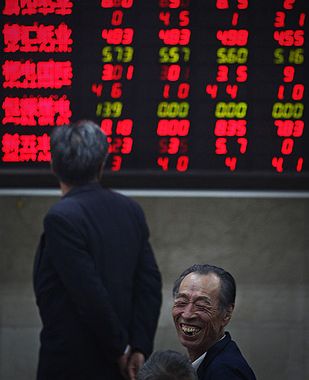Asian markets continue to rise
Japan’s Nikkei makes record gain of 14 per cent as markets rally for second straight day.

Australian shares were also impressive, with the benchmark S&P/ASX 200 index leaping almost six per cent before paring some gains, but still extending the 5.6 per cent rise it made on Monday – its biggest one-day percentage gain in 11 years.
The Australian government unveiled a A$10.4bn ($7.3bn) emergency stimulus package on Tuesday to guard the country’s economy from a global recession.
The move to make one-off state payments to low-income earners and pensioners came two days after the government guaranteed all bank deposits for three years.
It also made wholesale funding to Australian banks to protect them from the fallout from the global credit crisis.
Dow rallies
Share prices in China, South Korea, Singapore, Taiwan and New Zealand were also sharply higher on Tuesday, following Wall Street’s overnight rally.
The Dow Jones index of leading US shares saw its highest single-day surge in 76 years on Monday, closing 936.42 points, or 11.08 per cent, higher to end eight straight sessions of losses.
Al Jazeera’s Rob Winder, reporting from the trading floor on Wall Street, said people were cheering and punching the air as the closing bell sounded.
But while the mood seemed generally positive, analysts said there was a long way to go before the market rally could be described as a recovery, and the mood on the trading floor seemed to reflect that, our correspondent said.
Ammar Sankari, a financial expert who works on the NYSE, told Al Jazeera that the reason for the rally was that “some investors see that stock has reached attractive levels and that now is the time to buy in”.
“It will move a little higher, but you won’t see it moving up to around 10,000 points for some time. We need to see practical moves and hear that banks are lending again,” he said.
Share markets in Europe and the Middle East also rallied on Monday.
Government intervention
The markets’ surge followed co-ordinated moves over the weekend by European nations including the UK, France, Germany and Italy, to firm up banking systems.
| Europe’s rescue-package breakdown |
|
Germany: Up to 400bn euros ($543bn) in guarantees for banks, up to 80bn euros ($109bn) to recapitalise banks and 20bn euros ($27bn) to back up the guarantees. France: Up to 360bn euros ($489bn), including 320bn euros ($435bn) to guarantee bank refinancing and another 40bn euros ($54bn) for a government-backed agency to provide banks with extra capital. Spain: Will guarantee up to 100bn euros ($136bn) in bank bond issuance this year after 30bn euros ($41bn) promised last week for bank capitalisation. Austria: Up to 85bn euros ($115bn) in guarantees, and an additional 15bn euros ($20bn) in capital. Netherlands: Will guarantee up to 200bn euros ($272bn) in inter-bank loans, on top of what it pledged for bank capitalisation last week. Portugal: Announced on Sunday it would guarantee 20bn euros ($27bn) in inter-bank loans – nearly 12 per cent of annual economic output. Britain: Announced on October 8 a 50bn-pound ($87bn) plan to partly nationalise major banks and promised to guarantee a further 250bn pounds of bank loans. Up to 37bn pounds ($64bn) to boost balance sheets at three of Britain’s largest banks unveiled on Monday. Norway: Outside the euro zone and the EU, Norway plans to offer new government bonds worth 350bn kroner ($56bn) to banks to help improve liquidity in the market. |
George Bush, the US president, on Monday welcomed “the bold and specific follow up actions by European nations”.
“The United States is also acting, and we will continue to implement measures … to help banks gain access to capital, to strengthen the financial system and to unfreeze credit markets and restore confidence in the financial system,” he said.
Neel Kashkari, the official in charge of the country’s $700bn rescue package, announced US government plans later on Monday to buy stakes in a “broad array” of banks.
“The equity purchase programme will be voluntary and designed with attractive terms to encourage participation from healthy institutions,” he told a meeting of the Institute of International Bankers in Washington.
Bush was due to speak on Tuesday morning after meeting Henry Paulson, the treasury secretary, with Paulson following soon after with details of “a series of comprehensive actions to strengthen public confidence in our financial institutions and restore functioning of our credit markets”, his department said.
James Henry, an economist, told Al Jazeera he was optimistic about the government actions.
“We finally have Europe achieving some consensus. The United States and Europe now seem to be in accord on injecting substantial amounts of equity into the banking system.
“There is still more work to do – however, it is the end of the beginning. Maybe the fever has broken,” he said.
Henry added, however, that developing nations and homeowners were still facing problems.
He said that debt relief for mortgage holders was needed as well as tax breaks and the ability to withdraw funds for pensioners.
But Walden Bello, a senior analyst and former director of Focus on the Global South, said that a complete overhaul of the global financial system was needed to restore people’s trust in it.
“I think we are talking about drastic overhauling and the reinstitution of capital controls. The lifting of those controls between countries and financial sectors has been one of the causes of this financial mobility that has brought us 100 crises over the past 25 years,” he told Al Jazeera.
“I think we are going to be talking about severe regulation of the banking sector. Among this will be the banning of trading in derivatives, which Warren Buffet [an American investor and businessman] has called a financial means of mass destruction.
“I think we need to bring a whole new social criteria, in terms of lending and financial operations, [which] will mean channelling money into health and things like that.”